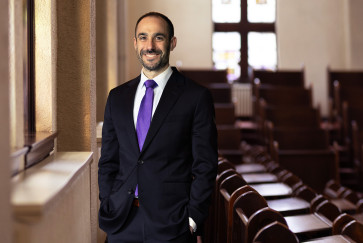Northwestern University has named Christopher Schuh the next dean of the Robert R. McCormick School of Engineering and Applied Science, effective Aug. 1. He also will serve as the John G. Searle Professor of Materials Science and Engineering.
A Northwestern alumnus, Schuh currently is the POSCO Professor of Materials Science and Engineering at the Massachusetts Institute of Technology (MIT), where he served as head of the Department of Materials Science and Engineering from 2011 to 2020. Schuh is the first McCormick alum to lead the school.
A member of the National Academy of Engineering, Schuh is a renowned researcher, serial entrepreneur and dedicated educator. He will succeed Julio M. Ottino, who will step down this summer after 18 years as dean of McCormick.
“Since receiving my Ph.D. at Northwestern in 2001, I have worn my title of ‘alumnus’ with tremendous pride,” Schuh said. “From the first time I arrived on campus in Evanston in the summer of 1997, I have held deep affection and admiration for the people at McCormick and throughout Northwestern. I am thrilled to return to my alma mater and to reunite with the incredibly accomplished and visionary faculty and passionate and talented students at McCormick.”
As head of the Department of Materials Science and Engineering at MIT, Schuh worked alongside faculty and staff to develop a sweeping strategic plan, designed to attract new faculty, expand space, launch new programs and provide a world-class educational experience for undergraduate, master’s and Ph.D. students.
During his tenure, Schuh oversaw significant growth and increased diversity of the faculty ranks and an increase in research expenditures. He worked to expand and redefine the department’s space profile, launch successful donor fundraising campaigns and roll out online materials science courses, which were offered to learners from all around the world. With newly raised funds, Schuh and his team achieved endowed fellowship support for all incoming graduate students, opened several new shared community labs and collaboration spaces, and launched new programs to encourage entrepreneurship and innovation among advanced students and postdoctoral researchers.
“We are proud to count Chris Schuh among our most accomplished alumni, and now we are delighted to bring him back to Northwestern to lead the McCormick School of Engineering,” Northwestern Provost Kathleen Hagerty said. “Chris sets the standard for excellence in everything he does, energizing the work of the students, faculty, staff and administrators around him. We are excited about the future of this renowned school under Chris’ dynamic leadership.”
Prior to joining MIT in 2002, Schuh held the Ernest O. Lawrence postdoctoral fellowship at Lawrence Livermore National Laboratory. His research is focused on structural metallurgy, in which he seeks to control disorder in metallic microstructures for the purpose of optimizing mechanical properties.
“The McCormick School of Engineering is an academic nerve center that thrives on creativity and innovation,” Northwestern President Michael Schill said. “Chris Schuh is a collaborative leader who not only embodies these qualities but also has a track record for carrying groundbreaking ideas to the marketplace. I am confident that Chris will further elevate the influence and impact McCormick has on the world through research, translation and the education of the next generation of engineers.”
As a seasoned entrepreneur, Schuh has co-founded a number of metallurgical companies. His first MIT spin-out company, Xtalic Corporation, commercialized a process from Schuh’s MIT laboratory to control the internal structure in metal electroplated coatings down to the nanometer scale, producing exceptional mechanical and functional properties. These nanocrystalline coatings provide wear and corrosion resistance to metal surfaces and are widely used in enterprise and personal electronic devices. Schuh also cofounded Desktop Metal, an additive manufacturing company producing 3-D metal printers that address a range of markets with an emphasis on production scale.
“It is a complicated intellectual trail from concept to invention, from patent to startup company, from license to fielded commercial products,” Schuh said, “I personally take great joy in following that trail and in supporting others to do so as well.”
Although he has a strong background in research and entrepreneurship, Schuh said his most important role is engineering educator. Throughout his time at MIT, Schuh taught key subjects in undergraduate and graduate core areas within materials science and engineering. In 2011, MIT named Schuh a MacVicar Faculty Fellow, an honor given to faculty who demonstrate outstanding undergraduate teaching, mentoring and educational innovation. Students describe his teaching style as fun, energetic and engaging while demonstrating a sincere interest in each student.
While at MIT, Schuh and his team also initiated a large online education initiative, allowing the faculty in his department to magnify their educational impact far beyond the walls of MIT. With these online offerings they also developed new pathways for students to enter the engineering field from community colleges and small liberal arts schools, supporting the growth and recruiting of students from diverse backgrounds into engineering.
“As a faculty member, I have always judged my success on the matriculation of my students into fulfilling and meaningful roles, carrying with them the worldview, science and technology I helped teach them,” Schuh said. “More than funds raised, citations or numbers of publications, my greatest career satisfaction lies in the successful careers of my former students as they build new products and industries and redefine the field.”
Schuh earned his bachelor’s degree at the University of Illinois at Urbana-Champaign in 1997 and Ph.D. from Northwestern in 2001. He has earned several awards, including election as a fellow of ASM International and The Minerals, Metals and Materials Society and as a member of the National Academy of Inventors.


